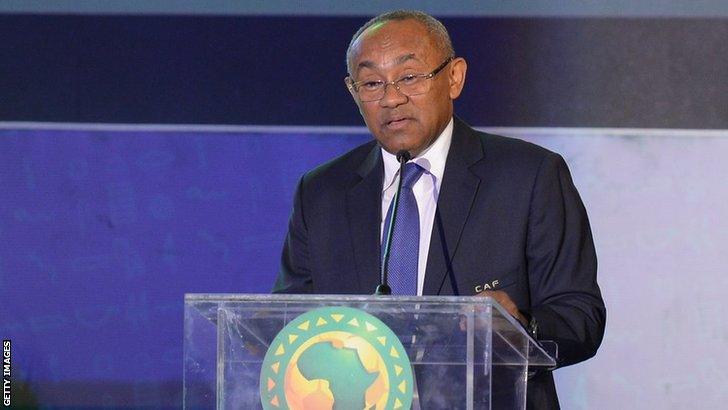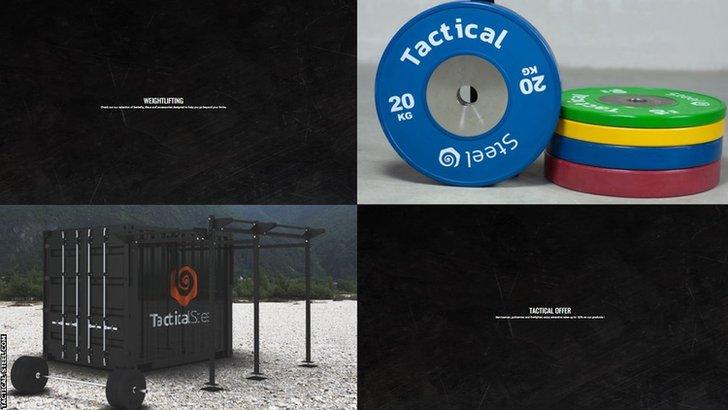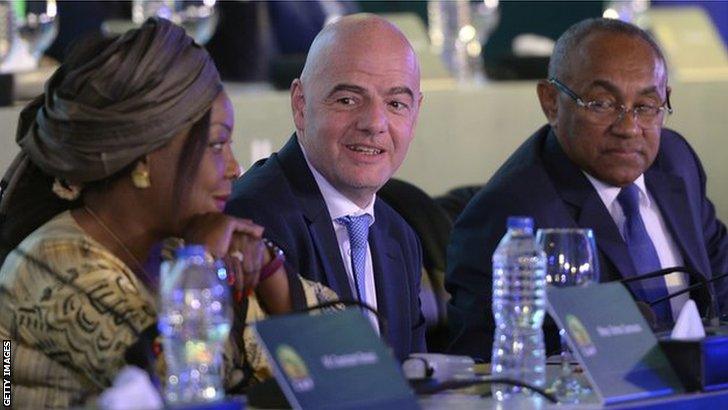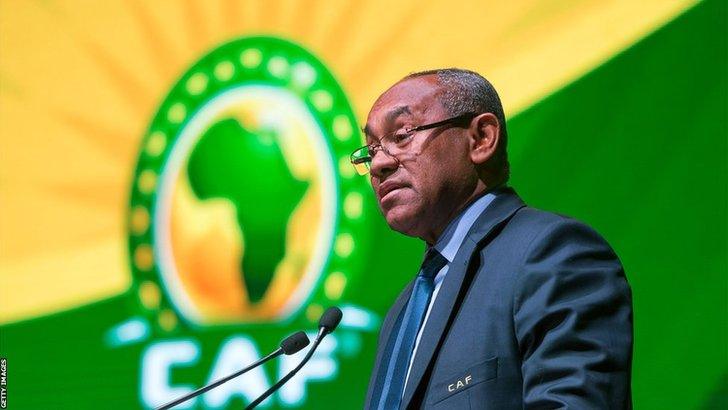Caf president Ahmad announces re-election bid
- Published

Ahmad has led the Confederation of African Football since 2017
Confederation of African Football (Caf) president Ahmad has submitted his candidacy to serve a second term in office when elections take place next March.
The 60-year-old, who took charge in 2017, has been formally entered into the race by Madagascar's federation, as per Caf rules which require any candidate to be nominated by his own association.
"I accepted to be a candidate while listening to the presidents of the federation, around 46 of whom asked me after receiving my assessment of my initial mandate," Ahmad told BBC Sport Africa.
Ahmad is deciding to stand again despite being the subject of an ongoing Fifa ethics enquiry, which has the potential to derail his bid and throw March's elections wide open.
"As I have previously announced, I said I would pursue a second mandate if the need was there," the Fifa vice-president explained.
Last week, all but eight federations on the continent gave their backing to the Malagasy to run again.
"This is an outcome of working together, of management which involves everybody, which has been happening since 2017," he said.
At present, Ahmad is the sole candidate to have submitted a candidacy during the registration period, which ends on 12 November, since Fifa Council member Tarek Bouchamoui, who had wanted to run, has effectively been blocked from running by the Tunisian FA.
A bid could come from Nigeria FA boss Amaju Pinnick who refused to rule himself out of the race when speaking to the BBC last month.
"It's always good during an election to have a rival candidate, but we wait," said Ahmad.
"I know that some people are awaiting other things unrelated to the elections - but as for the elections themselves, they all know they cannot beat me given I represent a group of people who want to go forward together."
Ahmad was seemingly referring to the looming Fifa Ethics case against him, which was opened last year after former Secretary General Amr Fahmy made various allegations to football's world governing body against the Malagasy - all of which Ahmad denies.
French anti-corruption authorities have also been interested by one of the allegations, which centres on a controversial deal with Tactical Steel, a little-known French gym manufacturer run by an old friend of Ahmad's then attaché, which provided sportswear equipment to Caf in 2017 after an original deal with Puma - slightly smaller, but costing four times less - was cancelled.

Tactical Steel's website highlights its role in both making and supplying gym - and not football - equipment
Fifa has yet to release information about the investigation but has twice sent auditors to Caf, with Pricewaterhouse Coopers - in a damning initial report that leaked in February - questioning missing funds amounting to over $20m while also calling for further investigation into Ahmad's role in the Tactical Steel affair.
"I challenge today for anyone to see me to find out what has become of the $24m they said we have stolen from Fifa," he said.
"I do not understand why it is taking so long. But I don't want to comment on that, especially as the investigation is ongoing and so confidentiality must surround the process. Time will tell."
AIMS

During Ahmad's reign, Fifa secretary general Fatma Samoura (left) was sent to Caf to improve governance
Should he be able to both run and secure a second term in office, Ahmad says he wants to introduce further change.
"My priority would be to continue reform on the administrative side, and restructure our competitions - improving our Champions League, strengthening our youth competitions and putting in place for the first time our Women's Champions League," he said.
Earlier this year, after an unprecedented period in football history when Fifa sent its own General Secretary Fatma Samoura to Caf in a bid to improve governance, Fifa president Gianni Infantino announced a billion-dollar plan to create an African Super League.
"We need Mr Infantino for that and all those who can give us help on that are welcome," said Ahmad about a plan of which little has been heard since.
He also says he wants to strengthen Africa's six regional zones, help individual associations undertake reform and boost Caf's financial presence in the digital media market.
REFLECTIONS

Caf president Ahmad believes the Nations Cup can be co-hosted by two-three countries in future
Ahmad is keen to build on what he believes are his greatest achievements so far.
"Expanding the Nations Cup to 24 teams, and being able to invite our professional players from everywhere," he said, referring to the fact that moving the event to June/July from January/February meant no Europe-based players missed the 2019 tournament.
"We also tried to convince our political leaders regarding the construction of sports stadiums and I can only bow to Cameroon President Paul Biya given all the investments in Cameroon, for the (2022) Nations Cup to be played there in very modern facilities. All that is part of my pride."
Critics argue that the expansion of the tournament to 24 teams means that only a handful of countries can now stage Africa's greatest sporting event given the increased demand on both economies and infrastructure.
"That's a fake problem," he said. "Why can't Africa organise a Nations Cup with two-three countries? There will be no worry about it."
His biggest regrets concern reform, which he says he has struggled to bring in.
"My regrets are seeing people who have fought alongside me for change who, in the end, didn't want change but to repeat what has been done before and what we ourselves had criticised. Maybe people didn't understand that reforming takes time."
Earlier this year, African football's ruling body created a so-called 'Transform Caf' programme, , externalwhich the Malagasy has said will bring credible reform to an organisation that has been battling on several fronts in recent times.